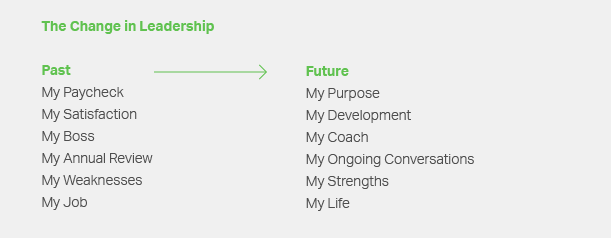Purpose, Passion, and Praise – Capturing the Hearts and Minds of Millennials in Today’s Workforce
Author
Jeff Zirker
Publish Date
January 29, 2018

Employers today face an unrelenting surge of millennials entering the work force at the same time other generations are getting out. This shift in demographics among the workforce is raising new (and not so new) challenges among company leaders as they focus on attracting and retaining the millennial generation while also facing operational and financial pressures in their business. How can companies ensure success with a generation of workers that is like no other to date?
The millennial generation, defined as those born between 1981 and 1998, is now the largest, and also the most disruptive. These dynamics present interesting challenges and opportunities for corporate leaders in all industries.
The Select Group, an award-winning technical services company based in Raleigh, NC took a deeper look at this issue. Senior executives from Atlanta companies gathered at a CIO Roundtable discussion to discuss the millennial workforce, their changing business imperatives, and how these two concerns intersect. Also joining the executives were a number of millennials themselves, who provided a very direct perspective on this issue and also offered recommendations of their own.
This white paper will summarize the roundtable discussion, provide pointers to more detailed research, and make recommendations for leaders to consider going forward.
Background
Millennials are the most digitally connected generation. Some 68% of millennials check their smartphone at least once an hour. Their interactions are instantaneous, digital, global, and widely shared. This generation is proving that business can be conducted, connections can be made, and global social impact can be accelerated all from the palm of their hand.
With this truth, another emerges – corporate leadership, infrastructure and culture may be out of touch with the millennial generation.
We are at a stage where company leaders are typically Baby Boomers on the cusp of retirement, or ill-prepared to learn and adopt rapidly changing technology used by their workforce. A true generational gap if ever there was one.
We looked to explore this issue a bit more deeply, in a roundtable format with many well-respected senior (no pun intended) IT leaders from the Greater Atlanta area. With representation from a number of industries, and a few millennials seeded among the tables, the host opened the discussion with a few interesting facts from the Pew Research Center:
- In April 2016, millennials surpassed Baby Boomers in living population: 75.4M vs. 74.9M
- 10,000 millennials turn 21 every day AND 10,000 Baby Boomers turn 65 every day
- In 2015, millennials surpassed Gen X’ers in the workforce population
- Most Baby Boomers are now retired and account for just one third of the workforce today
- Gen X and millennials account for two thirds of the current workforce
And, at a recent industry conference, Hireology also presented an equally interesting list of facts regarding millennials:
- 80% of millennials are optimistic they can have a better life
- Only 15% live with their parents, but 45% or more get ‘some support’ from mom and dad
- The average age at a millennial’s first job is 21
- In 2015, millennials surpassed Gen X’ers in the workforce population
- 67% aren’t sure when or if they will be able to retire
- But 35% still feel they are moving toward realizing their dreams
Discussion
With this backdrop, it’s clear that understanding millennial motivations and taking actions to appeal to them is critical. The millennials in attendance at the roundtable spoke of college debt, travel, flexibility, and friends. A passer-by might be inclined to write them off as those entitled young kids everyone is complaining about, but that would be unfair and would paint a picture very different from the millennial reality.
Everyone knows college debt is at an all-time high. Millennials are living with mom and dad longer, sometimes because of college debt, but not always. More college applicants than ever are applying to only one school. If or when that rejection letter comes, there is no backup plan, no “safe” schools. Millennials are more selective about where, how, and why they want to live their lives. Ending up with a single school, aligned to your beliefs and values, is sometimes preferable to blasting applications out to tens or hundreds of schools just to get in somewhere and be unfulfilled.
The millennial generation is uniquely connected, virtually “always on” and usually always learning. The dependency on an expensive college education, when placed against the landscape of rapid technology change (and resulting obsolescence of the school or degree subject matter), can render a formal degree program somewhat irrelevant in breakneck speed.
The millennials use online resources to bank, to shop, to watch TV or movies, putting the smart device at the center of their world.
Finally, the way millennials like to work is vastly different than years past. Agile stories, Scrums, hackathons, and the like, accelerate group learning through collaboration and have begun to inform companies on team structure more broadly, leveraging small, nimble teams powered by collaborative technology, high accountability, and a culture of appreciation and recognition.
So, Millennials, what would you have us do?
For the millennial, it’s quite simple: Purpose, Passion and Praise.
Purpose: Give millennials a reason to work for you. Be prepared to articulate your team or company’s aims to bring positive change to people and communities. Loyalty and purpose will guide the millennial generation. As you make your hiring decisions, keep in mind what one millennial roundtable participant offered: “The values I bring when I am hired is who I am.” Think about that for a moment, and consider the importance of screening and interviewing in your hiring process.
Learn about millennials as people, not as bodies to fill positions.
They know what their value can be to a company and they want to know you see it too, from the beginning. Expecting to force a person to change after hiring brings great challenge culturally (change is hard on people), operationally (loss of momentum and not leveraging strengths) and financially (they’ll leave and you’ll need to replace them).
A 2016 Harvard Business Review study titled “What Millennials Want from a New Job” found their generation the highest of all when it comes to desire for learning and growth. This appetite for greater learning ties directly into the employee’s sense of purpose and belonging.
Passion: Meaningful work and feeling valued is more important than compensation (within reason). Millennials certainly want to make money, but also feel strongly about feeling valued. This is the generation that watched their parents feel the early effects of outsourcing, massive layoffs, eight-to-five rigid company structures, and they surely don’t want to do the same. More frequent conversations with managers demonstrates that leadership cares, and is interested in the people they serve, not always the bottom line. Leaders – consider non-traditional ways of engaging with your workforce. The Select Group CEO takes groups of employees on extended team building events, where he dresses down and demonstrates great vulnerability through talking to people one-on-one, while walking a marathon, or hiking a mountain.
For those leaders who can’t get out like this with their teams, consider Reverse Mentoring – aligning a millennial worker with senior leadership, where the early-in-career employee can “coach” the highly-tenured people on technology, society, engaging with different generations, and can help bring awareness to things that otherwise may have been overlooked. By all reports from companies that use reverse mentoring, it’s seen as extremely valuable to both mentor and mentee.
Praise: A detailed 2016 Gallup Research paper “How Millennials Want to Work and Live” suggests: Millennial workers are more engaged than non-millennials when their managers provide frequent and consistent communication and feedback. Generally, for most employees, clarity and consistency from management are top priorities. But millennials are more apt to break from traditional performance management systems, stack rankings and the like, in favor of direct, candid, ongoing conversations with their leaders.
Our roundtable discussion found similar themes. A strong point was established: “Don’t blame millennials for problems management couldn’t address or fix.” To take this a step further – disconnected, distant management with shaky lines of communication to their staff, will not be able to see the issues as quickly, or may miss the issues altogether.
Meet the millennials where they are with feedback, frequent check-ins, and appropriate recognition.
Where it comes to performance management, there seems to be a desire among millennials to focus on results over metrics. Time or hours in the office, number of phone calls made, count of customer visits or similar metrics may get in the way of unleashing high performance among millennials without linking them clearly to success measures or actual results. They want to have some autonomy and flexibility to set their own course, within the parameters set by leadership. In companies with immature leadership or strained cultures, this can result in chaos. But well-managed and aligned to a greater good, autonomy can encourage creativity and out-of-the-box thinking – another positive characteristic among millennials.
Conclusion
In the forward to the aforementioned Gallup study, CEO Jim Clifton offered a simple chart to illustrate the millennial mindset shift:

It’s easy to see how Purpose, Passion and Praise fit into the image above. Managers who can find ways to engage with the new workforce in meaningful ways, and help move them from the past to the future will realize incredible benefits, in team and company performance, in hiring and retaining people aligned to a new culture, and in their personal relationships with the teams as well. An effectively engaged millennial workforce can turn into a loyal workforce, enhancing the company bottom line and providing them with rewarding and meaningful careers at the same time.
This post is from our CXO Blog series, written by Jeff Zirker, our Chief Experience Officer (CXO). See the rest of his collection here.
About the Author:

Jeff Zirker started with TSG in 2015 after more than 22 years with a leading U.S. technology company. His passion for people has led to the implementation of new processes and programs across the company designed to enhance customer experience. No stranger to adventure, Jeff once spent two weeks on an uninhabited Hawaiian island.
